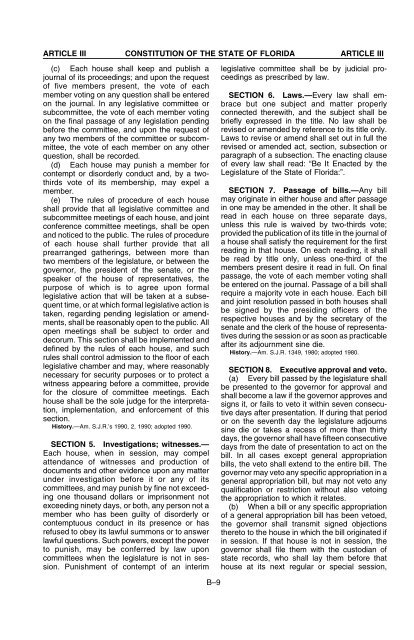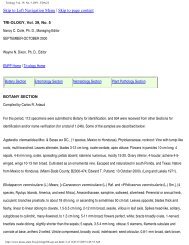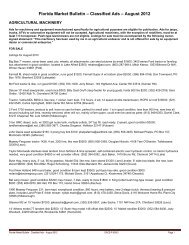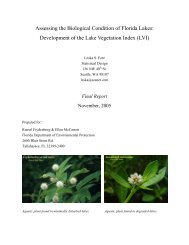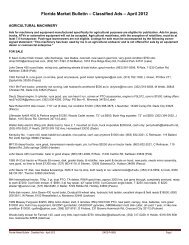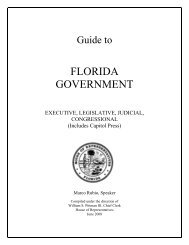Version A final setup - Florida House of Representatives
Version A final setup - Florida House of Representatives
Version A final setup - Florida House of Representatives
You also want an ePaper? Increase the reach of your titles
YUMPU automatically turns print PDFs into web optimized ePapers that Google loves.
ARTICLE III CONSTITUTION OF THE STATE OF FLORIDA ARTICLE III<br />
(c) Each house shall keep and publish a<br />
journal <strong>of</strong> its proceedings; and upon the request<br />
<strong>of</strong> five members present, the vote <strong>of</strong> each<br />
member voting on any question shall be entered<br />
on the journal. In any legislative committee or<br />
subcommittee, the vote <strong>of</strong> each member voting<br />
on the <strong>final</strong> passage <strong>of</strong> any legislation pending<br />
before the committee, and upon the request <strong>of</strong><br />
any two members <strong>of</strong> the committee or subcommittee,<br />
the vote <strong>of</strong> each member on any other<br />
question, shall be recorded.<br />
(d) Each house may punish a member for<br />
contempt or disorderly conduct and, by a twothirds<br />
vote <strong>of</strong> its membership, may expel a<br />
member.<br />
(e) The rules <strong>of</strong> procedure <strong>of</strong> each house<br />
shall provide that all legislative committee and<br />
subcommittee meetings <strong>of</strong> each house, and joint<br />
conference committee meetings, shall be open<br />
and noticed to the public. The rules <strong>of</strong> procedure<br />
<strong>of</strong> each house shall further provide that all<br />
prearranged gatherings, between more than<br />
two members <strong>of</strong> the legislature, or between the<br />
governor, the president <strong>of</strong> the senate, or the<br />
speaker <strong>of</strong> the house <strong>of</strong> representatives, the<br />
purpose <strong>of</strong> which is to agree upon formal<br />
legislative action that will be taken at a subsequent<br />
time, or at which formal legislative action is<br />
taken, regarding pending legislation or amendments,<br />
shall be reasonably open to the public. All<br />
open meetings shall be subject to order and<br />
decorum. This section shall be implemented and<br />
defined by the rules <strong>of</strong> each house, and such<br />
rules shall control admission to the floor <strong>of</strong> each<br />
legislative chamber and may, where reasonably<br />
necessary for security purposes or to protect a<br />
witness appearing before a committee, provide<br />
for the closure <strong>of</strong> committee meetings. Each<br />
house shall be the sole judge for the interpretation,<br />
implementation, and enforcement <strong>of</strong> this<br />
section.<br />
History.—Am. S.J.R.’s 1990, 2, 1990; adopted 1990.<br />
SECTION 5. Investigations; witnesses.—<br />
Each house, when in session, may compel<br />
attendance <strong>of</strong> witnesses and production <strong>of</strong><br />
documents and other evidence upon any matter<br />
under investigation before it or any <strong>of</strong> its<br />
committees, and may punish by fine not exceeding<br />
one thousand dollars or imprisonment not<br />
exceeding ninety days, or both, any person not a<br />
member who has been guilty <strong>of</strong> disorderly or<br />
contemptuous conduct in its presence or has<br />
refused to obey its lawful summons or to answer<br />
lawful questions. Such powers, except the power<br />
to punish, may be conferred by law upon<br />
committees when the legislature is not in session.<br />
Punishment <strong>of</strong> contempt <strong>of</strong> an interim<br />
B–9<br />
legislative committee shall be by judicial proceedings<br />
as prescribed by law.<br />
SECTION 6. Laws.—Every law shall embrace<br />
but one subject and matter properly<br />
connected therewith, and the subject shall be<br />
briefly expressed in the title. No law shall be<br />
revised or amended by reference to its title only.<br />
Laws to revise or amend shall set out in full the<br />
revised or amended act, section, subsection or<br />
paragraph <strong>of</strong> a subsection. The enacting clause<br />
<strong>of</strong> every law shall read: “Be It Enacted by the<br />
Legislature <strong>of</strong> the State <strong>of</strong> <strong>Florida</strong>:”.<br />
SECTION 7. Passage <strong>of</strong> bills.—Any bill<br />
may originate in either house and after passage<br />
in one may be amended in the other. It shall be<br />
read in each house on three separate days,<br />
unless this rule is waived by two-thirds vote;<br />
provided the publication <strong>of</strong> its title in the journal <strong>of</strong><br />
a house shall satisfy the requirement for the first<br />
reading in that house. On each reading, it shall<br />
be read by title only, unless one-third <strong>of</strong> the<br />
members present desire it read in full. On <strong>final</strong><br />
passage, the vote <strong>of</strong> each member voting shall<br />
be entered on the journal. Passage <strong>of</strong> a bill shall<br />
require a majority vote in each house. Each bill<br />
and joint resolution passed in both houses shall<br />
be signed by the presiding <strong>of</strong>ficers <strong>of</strong> the<br />
respective houses and by the secretary <strong>of</strong> the<br />
senate and the clerk <strong>of</strong> the house <strong>of</strong> representatives<br />
during the session or as soon as practicable<br />
after its adjournment sine die.<br />
History.—Am. S.J.R. 1349, 1980; adopted 1980.<br />
SECTION 8. Executive approval and veto.<br />
(a) Every bill passed by the legislature shall<br />
be presented to the governor for approval and<br />
shall become a law if the governor approves and<br />
signs it, or fails to veto it within seven consecutive<br />
days after presentation. If during that period<br />
or on the seventh day the legislature adjourns<br />
sine die or takes a recess <strong>of</strong> more than thirty<br />
days, the governor shall have fifteen consecutive<br />
days from the date <strong>of</strong> presentation to act on the<br />
bill. In all cases except general appropriation<br />
bills, the veto shall extend to the entire bill. The<br />
governor may veto any specific appropriation in a<br />
general appropriation bill, but may not veto any<br />
qualification or restriction without also vetoing<br />
the appropriation to which it relates.<br />
(b) When a bill or any specific appropriation<br />
<strong>of</strong> a general appropriation bill has been vetoed,<br />
the governor shall transmit signed objections<br />
thereto to the house in which the bill originated if<br />
in session. If that house is not in session, the<br />
governor shall file them with the custodian <strong>of</strong><br />
state records, who shall lay them before that<br />
house at its next regular or special session,


